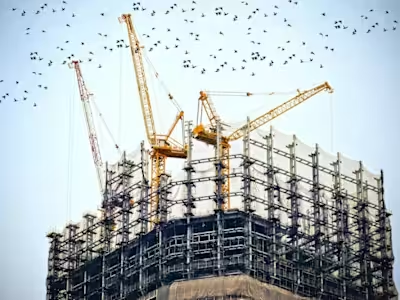Austin Texas Real Estate Market 2023 Forecast
As U.S. home prices start to come down from a pandemic-induced high, buyers are looking forward to a more balanced market. However, a buyer’s market isn’t necessarily guaranteed given that mortgage rates are high, housing is limited, and we just finished the spring home-buying season.
Several markets were deemed "in-demand" throughout 2021 and 2022 due to skyrocketing property values. Austin was certainly one of those in-demand markets, but not necessarily because of the pandemic.
Before 2020, thousands of people were already moving to Austin in search of better employment opportunities, an affordable cost of living, and a diverse range of lifestyles. Between 2010 and 2020, Austin’s population increased by over 400,000 and continued to grow well into the pandemic. By the end of 2021, the population in the Austin metro area had reached 2.35 million residents.
Over the last two decades, the city’s GDP has experienced an impressive 117% growth, allowing the local real estate market to recover faster than many others across the country. Prominent technology companies such as Tesla, Apple, and Google have planted their roots in Austin and attract a growing number of tech workers every year. This has strengthened the city’s demand for housing and kept the Austin real estate market stable despite rising interest rates and inflation.
A vibrant luxury real estate market has also developed, providing Austin real estate investors and agents with a unique opportunity to grow their businesses. Austin remains an excellent look for investment opportunities. In this article, we’ll discuss what to expect from the Austin, TX real estate market in 2023, the benefits of investing in the local market, and how to best identify investment properties.
What To Expect From the Austin Real Estate Investment Market in 2023
During the initial stages of the pandemic, buyers from all over the country quickly flocked to “Silicon Prairie” and purchased available properties, driving up home prices at an unprecedented pace. The surge in growth earned Austin a reputation for being one of the top markets of that time—a reputation that continues today.
However, as we approach the midway point of the year, Austin is witnessing a reversal of some growth trends, particularly in how long homes are staying on the market. Austin homes are now taking 4x longer to sell than they were last year, moving closer to the national median of 43 days. Although Austin homes are selling in just 40 days, in May of last year they were flying off the market, selling in as little as 10 days.
Furthermore, housing inventory has grown which has increased supply and brought down home prices, but only slightly. While it’s true that the Austin market has been affected by nationwide trends, it seems as though Austin has a strong buffer preventing the local real estate market from slowing down significantly. Where that buffer is believed to be an unrelenting job market that continues to attract and keep workers in the city.
Here are four key trends we can expect to observe in the Austin real estate market for the rest of the year:
Increased days on the market
According to data provided by RocketHomes, homes listed for sale in Austin, TX are staying on the market for a total of 40 days. This reflects an increase of +270.7% compared to May 2022. Still, with the average days on the market in the U.S. being just 43 days, the Austin market continues to perform relatively well.
Growing housing inventory
In April of this year, 4,641 homes were for sale in Austin. In May, there were 5,319 homes for sale, marking a 14.6% increase, month-over-month. The number of three-bedroom homes on the market grew 13.7% and four-bedroom homes grew 14.7% at the same time. Agents and investors can expect for the supply of homes to continue to increase throughout the year.
Declining home prices
Home prices are declining but only slightly. The median sales price of a home in Austin is currently $575,894, marking just a 0.4% decrease since May of last year. Three-bedroom homes are down 3.9%, selling at $539.9K and four-bedroom homes are down just 0.5%, selling at $723.8K.
Interestingly enough, homes with five bedrooms or more are up 8.5%, selling at $1.0M, when in May of last year they were selling at $997.7K. Although home prices are declining for most Austin properties, the reduction in sales prices is happening at a slow pace.
Increased housing demand fueled by a strong job market
Lastly, investors and agents want to keep in mind that the Austin housing market continues to be driven by strong housing demand which is fueled by a strong job market. Although home prices and the pace of home sales are adjusting from the anomalies of the past two years, the increase in new listings in the spring reflects growing confidence among sellers.
Additionally, recently announced layoffs in the tech industry have yet to indicate a downturn in Austin's job market or have an impact on housing demand. The job market in Travis County is projected to grow nearly twice as fast as the statewide job growth rate over the next decade, with the leisure and hospitality sector leading this expansion.
Benefits of Owning an Investment Property in Austin
Over the past decade, Austin has experienced rapid economic growth. As a result, the local housing market has gained significant momentum, with home values having more than doubled since 2010. While the Austin real estate market may not be as large as the Houston or San Antonio markets, it's the fourth-largest city in the state and the eleventh-largest city in the U.S. It’s a huge market with plenty of opportunities. Take a closer look at why investing in Austin real estate may be a good idea:
Austin’s large college student population chooses to stay after graduation
Student housing represents an opportunity to rent properties at a premium, particularly if they’re located near a large college. With more than 40,000 students enrolled at the University of Texas, Austin alone, the demand for rental properties remains high. Austin Community College accommodates a similar number of students. Huston Tillotson University, Saint Edward's University, and National American University further contribute to the student population in the city.
In Austin, many college graduates choose to stay in the city after graduation because of the abundance of well-paying jobs in the area. Austin boasts the highest per capita of high-paying jobs among all Texas cities. Many of these young adults are also starting their families in Austin, indicating a sustained future demand for housing in the local real estate market.
55% of households prefer to rent, rather than own
Currently, Austin has a high demand for rentals, with 55% of households opting to rent rather than own their homes. This creates a favorable rental market for landlords, as they have access to a large pool of potential tenants. This also provides real estate agents and brokers an opportunity to assist renters in transitioning into homeownership.
Austin is located in a landlord-friendly state
Texas has a strong track record of favoring landlords over tenants.Texas housing laws don’t impose a limit on security deposits, nor do they specifically allow tenants to withhold rent due to a lack of essential services. Additionally, there is no minimum timeframe mandated in Texas before landlords can increase rent.
If a tenant fails to pay rent, landlords can initiate the eviction process after just a three-day notice period. In the case of significant lease violations, landlords have the right to terminate the lease immediately and provide the tenant with a three-day notice to vacate the premises.
Evicting a non-paying tenant is typically an easier process in Texas when compared to more liberal states across the country. This can certainly be a motivating factor when considering investing in the Austin real estate market or other housing markets in Texas.
Identify Exclusive Austin Investment Properties
Locating the right kind of investment property at any given time in the market can be challenging. Local housing markets are constantly shifting. Without up-to-date real estate data, it can be difficult for investors to make informed and strategic investment decisions.
Using PropStream’s proprietary technology, real estate investors can use real-time, localized real estate data to inform all of their property investment decisions on one convenient platform. Sign up for a 7-day free trial to find out why real estate agents and investors across the country trust us with their real estate lead generation activities.
Like this project
Posted Aug 20, 2023
Austin, Texas has experienced an impressive 117% growth, allowing the local real estate market to recover faster than many others across the country.







